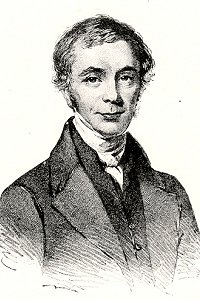Introduction

Born: April 25, 1792, Fairford, Gloucestershire, England.
Died: March 29, 1866, Bournemouth, Hampshire, England.
Buried: All Saints churchyard, Hursley, Hampshire, England.


Born: April 25, 1792, Fairford, Gloucestershire, England.
Died: March 29, 1866, Bournemouth, Hampshire, England.
Buried: All Saints churchyard, Hursley, Hampshire, England.

Keble was the son of the vicar of Colne.
After a brilliant career at Oxford University, he took Holy Orders and became curate at East Leach and Burthorpe.
In 1831, Keble became a professor of poetry at Oxford. In 1833, he laid the foundation of the Oxford Movement by delivering his famous Assize Sermon. In 1835, he accepted the vicarage at Hursley, where he stayed the rest of his life.
Keble was a modest man, and probably thought less of his own work than did the least of his admirers. He once accompanied the vicar of a parish in southern England on his visit to the Sunday School.
The superintendent asked Keble to say a few words to the children, who were already acquainted with his hymns, so that they might more easily remember them. Keble demurred, but when the superintendent persisted, said May they sing something?
When they finished, his face was beaming as he said:
My dear children, you sang most beautifully in tune; may your whole lives be equally in tune, and then you will sing with the angels in heaven.
Awake—again the Gospel-trump is blown—
From year to year it swells with louder tone,
From year to year the signs of wrath
Are gathering round the Judge’s path,
Strange words fulfilled,
And mighty works achieved,
And truth in all the world
Both hated and believed.
Awake! why linger in the gorgeous town,
Sworn liegemen of the Cross and thorny crown?
Up from your beds of sloth for shame,
Speed to the eastern mount like flame,
Nor wonder, should ye find your King in tears,
E’en with the loud Hosanna ringing in His ears.
Alas! no need to rouse them: long ago
They are gone forth to swell Messiah’s show:
With glittering robes and garlands sweet
They strew the ground beneath His feet:
All but your hearts are there—
O doomed to prove
The arrows winged in Heaven
For Faith that will not love!
Meanwhile He passes
Through th’ adoring crowd,
Calm as the march of some majestic cloud,
That o’er wild scenes of ocean-war
Holds its still course in Heaven afar:
E’en so, heart-searching Lord, as years roll on,
Thou keepest silent watch
From Thy triumphal throne:
E’en so, the world is thronging round to gaze
On the dread vision of the latter days,
Constrained to own Thee, but in heart
Prepared to take Barabbas’ part:
Hosanna
now, to-morrow Crucify,
The changeful burden still
Of their rude lawless cry.
Yet in that throng of selfish hearts untrue
Thy sad eye rests upon Thy faithful few,
Children and childlike souls are there,
Blind Bartimeus’ humble prayer,
And Lazarus wakened from his four days’ sleep,
Enduring life again, that Passover to keep.
And fast beside the olive-bordered way
Stands the blessed home
Where Jesus deigned to stay,
The peaceful home, to Zeal sincere
And heavenly Contemplation dear,
Where Martha loved to wait
With reverence meet,
And wiser Mary lingered at Thy sacred feet.
Still through decaying ages as they glide,
Thou lov’st Thy chosen remnant to divide;
Sprinkled along the waste of years
Full many a soft green isle appears:
Pause where we may upon the desert road,
Some shelter is in sight,
Some sacred safe abode.
When withering blasts of error swept the sky,
And Love’s last flower
Seemed fain to droop and die,
How sweet, how lone the ray benign
On sheltered nooks of Palestine!
Then to his early home did Love repair,
And cheered his sickening heart
With his own native air.
Years roll away: again the tide of crime
Has swept Thy footsteps
From the favoured clime
Where shall the holy Cross find rest?
On a crowned monarch’s mailèd breast:
Like some bright angel o’er the darkling scene,
Through court and camp he holds
His heavenward course serene.
A fouler vision yet; an age of light,
Light without love, glares on the aching sight:
Oh, who can tell how calm and sweet,
Meek Walton, shows thy green retreat,
When wearied with the tale thy times disclose,
The eye first finds thee
Out in thy secure repose?
Thus bad and good their several warnings give
Of His approach, whom none may see and live:
Faith’s ear, with awful still delight,
Counts them like minute-bells at night.
Keeping the heart awake till dawn of morn,
While to her funeral pile
This aged world is borne.
But what are Heaven’s alarms
To hearts that cower
In willful slumber, deepening every hour,
That draw their curtains closer round,
The nearer swells the trumpet’s sound?
Lord, ere our trembling lamps
Sink down and die,
Touch us with chastening hand,
And make us feel Thee nigh.
John Keble
The Christian Year, 1827